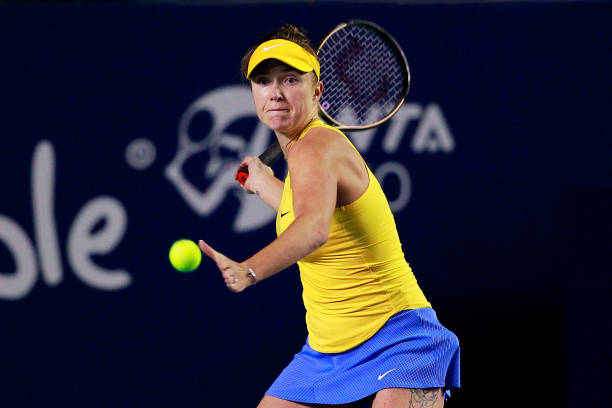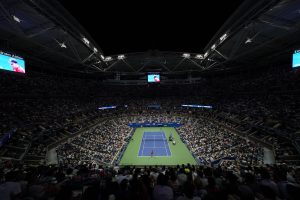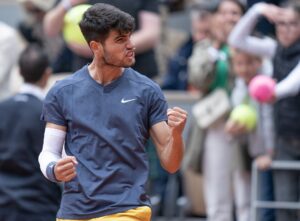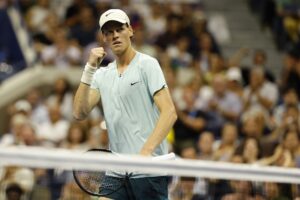As Russia’s invasion of Ukraine unfolds, the professional tennis community appears firmly united in support of peace. Ukrainian and Russian players in the ATP and WTA are leading this effort, commenting in the press, posting on social media––even fighting on the front lines.
For Ukrainian Sergiy Stakhovsky, last week’s invasion was life-altering. In January, Stakhovsky played his final Grand Slam in Australia, retiring from the ATP Tour after 19 years of professional tennis. Less than two months later, he began serving with the Ukrainian military to defend his country against Russian forces. “I’m not a soldier. I know how to use the guns but I have never shot anyone and I’ve never been in a gunfight,” Stakhovsky said last week. “It’s not really something that I’m looking forward to but if it’s necessary I will do it.”
Dayana and Ivanna Yastremska faced a similar crisis. Waking up to the sound of bombs, the Ukrainian sisters entered Romania last week after a four-hour escape from Odessa, Ukraine. Following a doubles wild card entry at the WTA’s Lyon Open, they fell 2-6 4-6 to Spaniard Georgina Garcia-Perez and Switzerland’s Xenia Knoll in Monday’s first round. Dayana, who reached a career-high singles ranking of #21 in 2020, praised her 15-year-old sister Ivanna for walking onto the court draped in a Ukrainian flag. “Right now, Ivanna is coming with me and I have a huge responsibility. I’m proud of her––she’s just starting out in professional tennis.”
Ukrainian players elsewhere in the world joined in vocal support of their country. Illya Marchenko, who achieved a career-high singles ranking of #49 in 2016, spoke out about having family members still living in Ukraine. “We hope that our military forces [in Ukraine] are ready for it,” he said in an interview with BBC last week.
Perhaps the strongest sentiment against the ongoing war came yesterday from Ukraine’s Elina Svitolina. Posting a statement on her official Twitter account, Svitolina, a 16-time WTA singles champion, called upon the ATP, WTA, and ITF to take action against Russian and Belorussian tennis players, pointing to the International Olympic Committee’s (IOC) recommendation to only accept Russian and Belorussian competitors as neutral athletes without national colors, flags, or symbols. Svitolina only agreed to play Russia’s Anastasia Potapova Tuesday in the second round of the WTA Monterrey Open after receiving assurances about her opponent’s neutral colors and symbols. The Ukrainian then competed wearing blue and yellow to represent Ukraine’s flag.
On the Russian side, many players have joined their Ukrainian colleagues in denouncing the conflict, bravely speaking out against their own government in the process. On the men’s side, top ten ranked players Andrey Rublev and Daniil Medvedev both expressed support for peace. After winning his semifinal match against Poland’s Hubert Hurkacz 3-6 7-5 7-6 (5) at last week’s Dubai Tennis Championship, Rublev jotted “No war please” on a courtside camera lens. For Medvedev, the joy of earning the World #1 ranking this week was partially soured by Russia’s invasion of Ukraine. On Monday, he posted an acknowledge message to Twitter, expressing “mixed emotions” to receive the new ranking while Russia’s invasion continues.
Russia’s #1 female player, Anastasia Pavlyuchenkova, went even further in condemning the war. In a Twitter post from earlier this week, the Tokyo Olympic Gold Medalist lamented about her friends and family living in Russia. “This is my home and my country. But now I am in complete fear, as are my friends and family,” she wrote. “Stop the violence, stop the war.”
Tuesday, the ATP, WTA, and ITF released a joint statement outlining new restrictions related to the ongoing war. According to the statement, all tournaments scheduled to take place in Russia have been suspended. Additionally, Russian and Belorussian teams are restricted from playing in ITF international events, like Davis Cup, until further notice. While individual Russian and Belorussian players can still enter ATP/WTA tournaments and Grand Slams, they must compete without association to their respective country or national flag “until further notice.”
Main Photo:
Embed from Getty Images






